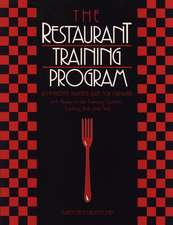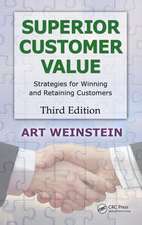Segmentation Strategies for Hospitality Managers: Target Marketing for Competitive Advantage
Autor Ron Morritt, Art Weinsteinen Limba Engleză Hardback – 15 dec 2006
Effective market segmentation approaches can show a company which customer group is most profitable and how to best serve their needs. Segmentation Strategies for Hospitality Managers: Target Marketing for Competitive Advantage is a marketing primer whose time has come, teaching segmentation approaches that can make a difference where it really counts—the bottom line. Introductory to intermediate level hospitality managers and students are provided with easy-to-follow explanations and effective learning exercises that will help them grasp segmentation concepts and strategies quickly. Unlike other hospitality marketing textbooks out there, this book persistently focuses specifically on segmentation and positioning strategies.
Segmentation Strategies for Hospitality Managers effectively tells how to best use the integrated resources of a hospitality firm to gain and maintain the competitive edge. Examples are taken from the hotel, restaurant, and airline industries to give a well-rounded view of the industry’s practical and productive use of segmentation strategies. The text explains advantages and limitations of various segmentation strategies such as relationship or niche marketing to help assist managers in their own future decision-making process. Detailed chapter summaries and challenging end-of-chapter exercises further reinforce each chapter’s concepts and approaches. Extensive references, several illustrative figures and tables, and specific case examples from various hospitality sectors are included.
Topics in Segmentation Strategies for Hospitality Managers include:
- positioning strategy
- niche marketing
- relationship marketing
- marketing trends
- technology’s impact on the hospitality industry
- special issues in segmentation strategy (including integration of segmentation strategy with branding, yield management, and IT strategy)
- and more!
Preț: 767.20 lei
Preț vechi: 1241.12 lei
-38% Nou
Puncte Express: 1151
Preț estimativ în valută:
146.80€ • 153.69$ • 121.47£
146.80€ • 153.69$ • 121.47£
Carte tipărită la comandă
Livrare economică 07-21 aprilie
Preluare comenzi: 021 569.72.76
Specificații
ISBN-13: 9780789022165
ISBN-10: 0789022168
Pagini: 248
Dimensiuni: 156 x 216 x 22 mm
Greutate: 0.62 kg
Ediția:1
Editura: Taylor & Francis
Colecția Routledge
Locul publicării:Oxford, United Kingdom
ISBN-10: 0789022168
Pagini: 248
Dimensiuni: 156 x 216 x 22 mm
Greutate: 0.62 kg
Ediția:1
Editura: Taylor & Francis
Colecția Routledge
Locul publicării:Oxford, United Kingdom
Cuprins
- Foreword (Desmond Henry)
- Preface and Acknowledgments
- Chapter 1. Introduction to Segmentation
- Overview of the Hospitality Industry
- Market Segmentation: An Overview
- Segmentation Practices in the Hotel Industry
- Niche Marketing
- Advantages and Risks of Niche Marketing
- Using Market Segmentation to Develop a Competitive Advantage
- Summary
- Exercises
- Chapter 2. Segmentation Bases: Panning for Gold in the Hospitality Sector
- Segmentation Bases Used in the Hospitality Industry
- Your Customer Database
- Summary
- Exercises
- Chapter 3. Niche Marketing
- Introduction
- The Ritz-Carlton Hotel Chain: World-Class Niche Marketing
- Porter’s Strategy of Focus
- Summary
- Exercises
- Chapter 4. Niche Marketing for Hotel Managers
- Introduction
- Segmenting Your Local Market
- Market Trends
- Segment Selection
- Segmentation Bases
- Selection Methods for Smaller Resort Hotels
- Chapter 5. Relationship Marketing
- Introduction
- Strengths and Limitations of RM
- Measuring Customer Relationships
- Customer Relationship Management (CRM)
- Summary
- Exercises
- Chapter 6. Special Issues in Segmentation
- The Evolution of Market Segmentation
- Summary
- Exercises
- Chapter 7. The Impact of Marketing Trends on Segment Selection
- Major Marketing Trends
- Future Trends
- Environmental Scanning
- Summary
- Exercises
- Chapter 8. The Segmentation Process
- Segmentation As Part of a Target Marketing Strategy
- Stage One: Market Segmentation
- A Feedback Model of the Segmentation Process
- Segmentation Research and Analysis Techniques
- Stage Two: Segment Targeting
- Patterns of Target Market Selection
- Segmentation Selection and Strategic Fit
- Using Guest Databases for Segment Selection
- Stage Three: Segment Positioning
- Summary
- Exercises
- Chapter 9. Positioning Strategy
- Introduction
- Components of Consumer Product Perceptions
- Elements of Positioning
- Methods of Positioning
- Positioning Strategies
- Effective Positioning
- Branding and Positioning
- Perceptual Mapping: A Positioning Tool
- The Positioning Process
- Summary
- Exercises
- Chapter 10. The Impact of New Technology on the Hospitality Industry
- Technology As a Marketing Tool
- Drivers of IT Change
- Pitfalls and Liabilities
- Summary
- Exercises
- Chapter 11. Your Segmentation Battle Plan: Strategy and Tactics
- Your Strategic Segmentation Plan
- Market Segmentation Audit
- Summary
- Exercises
- References
- Index
Descriere
Effective market segmentation approaches can show a company which customer group is most profitable and how to best serve their needs. Segmentation Strategies for Hospitality Managers: Target Marketing for Competitive Advantage is a marketing primer whose time has come, teaching segmentation approaches that can make a difference where it really counts—the bottom line. Introductory to intermediate level hospitality managers and students are provided with easy-to-follow explanations and effective learning exercises that will help them grasp segmentation concepts and strategies quickly. Unlike other hospitality marketing textbooks out there, this book persistently focuses specifically on segmentation and positioning strategies.






















